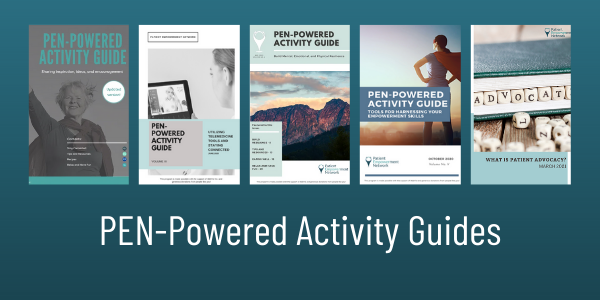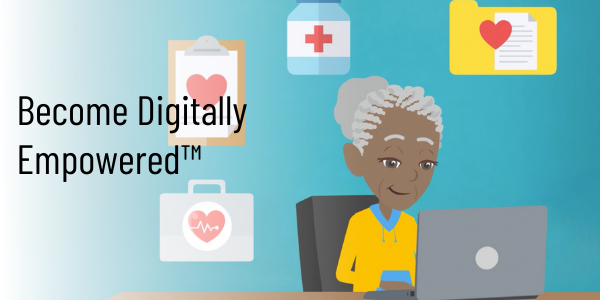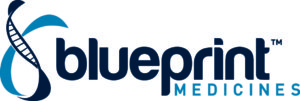How Stress Can Play a Role at the Time of a Cancer Diagnosis
How Stress Can Play a Role at the Time of a Cancer Diagnosis from Patient Empowerment Network on Vimeo.
MPN Network Managers Jeff and Summer share how they’ve overcome and continue to overcome the stresses that follow a cancer diagnosis.
Although, surprised at the time of her diagnosis Summer remained positive. As a care partner at the time of diagnosis, Jeff was fearful because he knew very little about myelofibrosis. To counteract this stress, he armored hisself with knowledge from various resources. Both Jeff and Summer use their hobbies as an outlet whether it’s nature photography or teaching improv classes to further relieve stress.
Want to connect with Jeff and Summer? Email them at question@powerfulpatient.org or text EMPOWER to (833)213-6657.
What You Need to Know Before Choosing a Cancer Treatment
What You Need to Know Before Choosing a Cancer Treatment from Patient Empowerment Network on Vimeo.
Haga clic aquí para ver en español
What steps could help you and your doctor decide on the best treatment path for your specific cancer? This animated video explains how identification of unique features of a specific cancer through biomarker testing could impact prognosis, treatment decisions and enable patients to get the best, most personalized cancer care.
If you are viewing this from outside of the US, please be aware that availability of personalized care and therapy may differ in each country. Please consult with your local healthcare provider for more information.
Related Programs:

|

|
TRANSCRIPT:
Dr. Jones:
Hi! I’m Dr. Jones and I’m an oncologist and researcher. I specialize in the care and treatment of patients with cancer.
Today we’re going to talk about the steps to accessing personalized care and the best therapy for YOUR specific cancer. And that begins with something called biomarker testing.
Before we start, I want to remind you that this video is intended to help educate cancer patients and their loved ones and shouldn’t be a replacement for advice from your doctor.
Let’s start with the basics–just like no two fingerprints are exactly alike, no two patients’ cancers are exactly the same. For instance, let’s meet Louis and another patient of mine, Ben. They both have the same type of cancer and were diagnosed around the same time–but when looked at up close, their cancers look very different. And, therefore, should be treated differently.
We can look more closely at the cancer type using biomarker testing, which checks for specific gene mutations, proteins, chromosomal abnormalities and/or other molecular changes that are unique to an individual’s disease.
Sometimes called molecular testing or genomic testing, biomarker testing can be administered in a number of ways, such as via a blood test or biopsy. The way testing is administered will depend on YOUR specific situation.
The results could help your healthcare team understand how your cancer may behave and to help plan treatment. And, it may indicate whether targeted therapy might be right for you. When deciding whether biomarker testing is necessary, your doctor will also take into consideration the stage of your cancer at diagnosis.
Louis:
Right! My biomarker testing results showed that I had a specific gene mutation and that my cancer may respond well to targeted therapy.
Dr. Jones, Can you explain how targeted therapy is different than chemo?
Dr. Jones:
Great question! Over the past several years, research has advanced quickly in developing targeted therapies, which has led to more effective options and better outcomes for patients.
Chemotherapy is still an important tool for cancer treatment, and it works by affecting a cancer cell’s ability to divide and grow. And, since cancer cells typically grow faster than normal cells, chemotherapy is more likely to kill cancer cells.
Targeted therapy, on the other hand, works by blocking specific mutations and preventing cancer cells from growing and dividing.
These newer therapies are currently being used to treat many blood cancers as well as solid tumor cancers. As you consider treatments, it’s important to have all of the information about your diagnosis, including biomarker testing results, so that you can discuss your treatment options and goals WITH your healthcare team.
Louis:
Exactly–Dr. Jones made me feel that I had a voice in my treatment decision. We discussed things like potential side effects, what the course of treatment looks like and how it may affect my lifestyle.
When meeting with your healthcare team, insist that all of your questions are answered. Remember, this is YOUR life and it’s important that you feel comfortable and included when making care decisions.
Dr. Jones:
And, if you don’t feel your voice is being heard, it may be time to consider a second—or third—opinion from a doctor who specializes in the type of cancer you have.
So how can you use this information to access personalized treatment?
First, remember, no two cancers are the same. What might be right for someone else’s cancer may not work for you.
Next! Be sure to ask if biomarker testing is appropriate for your diagnosis. Then, discuss all test results with your provider before making a treatment decision. And ask whether testing will need to be repeated over time to identify additional biomarkers.
Your treatment choice should be a shared decision with your healthcare team. Discuss what your options and treatment goals are with your doctor.
And, last, but not least, it’s important to inquire about whether a targeted therapy, or a clinical trial, might be appropriate for you. Clinical trials may provide access to promising new treatments.
Louis:
All great points, Dr. Jones! We hope you can put this information to work for you. Visit powerfulpatients.org to learn more tips for advocating for yourself.
Dr. Jones:
Thanks for joining us today.
This program is supported by Blueprint Medicines, and through generous donations from people like you.

Communicating About Cancer: A Brief Guide to Telling People Who Care
Getting a cancer diagnosis can easily be the most terrifying, heart-wrenching experiences one has in their lifetime. Everything from different treatment options (if you’re lucky), to financing, and maintaining quality of life suddenly are in full force front and center. It can be hard to know who to turn to if you’re not directed to a support group (of which there are many), and especially how to tell loved ones and co-workers. The choice is yours, of course, in whom you wish to tell and when – there is no right or wrong answer. (However, I and many others have found that having a caregiver to help manage appointments, billing, etc. can help).
Should you choose to tell others, here are some tips that I have read and/or heard from other cancer patients/survivors as well as some I have found personally helpful:
Kids:
- It depends on the age – using simpler terms with younger kids (8 and under) may be more helpful, while older kids and teens can understand more detail. For example, saying that you’re sick and you’re getting the best care from a team of doctors who really want to help you get better
- According to the American Cancer Society, children need to know the basics, including:
- The name of the cancer
- The specific body part(s) of where it is
- How it’ll be treated
- How their own lives will be affected
- Think of a list of questions ahead of time that you think they may ask and jot down answers, such as how the cancer happened (that it’s not anyone’s fault), if it’s contagious, and/or if it’ll be fatal
- Make sure that they know you are open to talking about it at any time. You can also perform check-ins with each other to monitor feelings
Family and friends:
- Select a group of people, including immediate family and close friends
- Divulge information only you feel comfortable sharing. Maybe it’s the basics, as mentioned above, or more detailed information
- Prepare for different reactions, including sadness, anger, frustration, depression, anxiety, compassion, and support
- Also prepare for people to not feel comfortable and feel as if they’re helpless. A cancer diagnosis is a heavy weight to bear, and not everyone will feel like the have the capacity to help as much as they want to
- As the patient, tell them how you’re looking for support (ex. what are your needs during this time, including physical, emotional, mental). Guiding members of your support system to get your needs met may help them feel more at ease and able to help
Work:
- Telling a supervisor/manager may be one of the hardest tasks for fear of discrimination
- However, the Americans with Disabilities Act (ADA), which covers employers with 15 ore more employees, prohibits discrimination based on:
- Actual disability
- A perceived history of disability
- A misperception of current disability
- History of disability
- The ADA also:
- Protects eligible cancer survivors from discrimination in the workplace
- Requires eligible employers to make “reasonable accommodations” to allow employees to function properly on the job
- Ensure that employers must treat all employees equally
- The Family and Medical Leave Act (FMLA) also gives you the right to take time off due to illness without losing your job
- However, an employee must have worked for his or her employer for at least 12 months, including at least 1,250 hours during the most recent 12 months in order to qualify. The law applies to workers at all government agencies and schools nationwide as well as those at private companies with 50 or more employees within a 75-mile radius
- The Federal Rehabilitation Act prohibits employers from discriminating against employees because they have cancer
- However, this act applies only to employees of the federal government, as well as private and public employers who receive public funds
- However, the Americans with Disabilities Act (ADA), which covers employers with 15 ore more employees, prohibits discrimination based on:
Sources:
- https://www.cancer.org/treatment/children-and-cancer/when-a-family-member-has-cancer/dealing-with-diagnosis/how-to-tell-children.html
- https://www.cancerandcareers.org/en/at-work/legal-and-financial/cancer-and-the-ada-fmla
- https://www.nccn.org/patients/resources/life_with_cancer/talk_to_children.aspx#:~:text=Tell%20your%20children%20how%20much,when%20they%20normally%20see%20you.
- https://www.cancercare.org/publications/22-talking_to_children_when_a_loved_one_has_cancer
- https://www.cancer.gov/about-cancer/coping/adjusting-to-cancer/talk-to-children
- https://www.cancerandcareers.org/en/looking-for-work/job-search-disclosure/managing-disclosure-when-looking-for-a-job
- https://www.cancerandcareers.org/en/at-work/employers-managers
- https://www.cancerandcareers.org/en/at-work/coworkers
- https://www.cancerandcareers.org/en/looking-for-work/networking
- https://www.cancer.org/treatment/understanding-your-diagnosis/telling-others-about-your-cancer.html
- https://www.cancerhealth.com/article/tell-someone-cancer
- https://www.cancer.net/coping-with-cancer/talking-with-family-and-friends/talking-about-cancer/talking-with-someone-who-has-cancer
- https://www.cancer.net/coping-with-cancer/talking-with-family-and-friends/talking-about-cancer/talking-with-your-spouse-or-partner-about-cancer
- https://www.cancer.net/coping-with-cancer/talking-with-family-and-friends/talking-about-cancer/talking-with-teens-about-cancer
Carly Flumer is a young woman who was diagnosed with stage I papillary thyroid cancer at the age of 27. She recently received her Master’s degree from Boston University in Health Communication and received her Bachelor’s from George Mason University in Health Administration and Policy. While being diagnosed with the “C” word at such a young age was a surprise, as it would be to anyone, she found strength, support, and inspiration in sharing her cancer journey on social media. As a result of her health outcome, she looks to advocate for other cancer patients through education, research, and health literacy.
Empowered! Podcast: Meet Andrea Conners
Today, we’re extremely proud to introduce our first-ever Empowered! podcast. Empowered! will bring you conversations around topics that are important to patients and care partners.
For our first episode, we meet Andrea Conners. Andrea is Patient Empowerment Network’s Executive Director. Andrea shares a little bit about herself, about PEN, and her inspiration in getting involved.
About the Doctors
This podcast was originally published by BBC You Me & the Big C by April 26, 2018, here.
Former Arsenal and Celtic footballer John Hartson and Rachael’s surgeon Richard joins #YouMeBigC as we look at the relationships between cancer patients and their medical teams.
Why Getting a 2nd and 3rd Opinion Made a Difference In Her Cancer Treatment, With Sasha Denisova
This podcast was originally publish on WE Have Cancer by on May 7, 2019 here.
Sasha Denisova – WE Have Cancer
Seeking out a 2nd and 3rd opinion in her cancer treatment resulted in a dramatic improvement in Sasha Denisova’s quality of life.
Sasha first appeared on this podcast in Episode 83 where she shared the struggle she faced getting doctors to take her colorectal cancer symptoms seriously.
During our latest conversation she discussed why she made the decision to forego treatment at the Mayo Clinic in Minnesota to seek treatment at Memorial Sloan Kettering in New York City. We also discussed:
- How she got the courage to challenge the initial treatment recommendations made by her doctor and why it’s important for everyone to advocate for their best care.
- The importance 0f seeking out opinions from the top rated cancer facilities in the U.S.
- How she eased herself back into working out in the gym and why working with a guided fitness instructor was important.
- Why exercise is vital to her well-being and how most cancer patients can find an exercise routine that works for them.
Take Control Of Your Care When You’re Seriously Sick via NPR
This podcast was originally publish on NPR by John Henning Schumann, Mara Gordon, and Chloee Weiner on September 7, 2019 here.
Finding out you have a serious medical condition can leave you reeling. These strategies from medical and lay experts will help you be in control as you navigate our complex health care system and get the best possible care.
Here’s what to remember:
1. Your primary care doctor is the captain of your health care team.
With any serious diagnosis, there will usually be more specialists to see. Having a primary care doctor you trust helps coordinate the information flow and keep track of the big picture. Your primary is on her toes for possible medication interactions. Regular preventive measures shouldn’t be overlooked, either.
2. Don’t be afraid to get a second opinion.
If you’re offered treatment such as chemotherapy or surgery that can be life-altering, it’s crucial to get more than one opinion, ideally from a doctor working for a different institution. Oncologists and surgeons expect patients to seek second opinions — many provide them as a major part of their practice. If your doctor resents you seeking more opinions, that’s a red flag.
3. Get organized, stay organized, and find someone to help you if you can’t do it yourself.
Make a list of what you hope to accomplish at the doctor’s office. If for some reason you aren’t able to take notes, bring someone along who can act as an advocate and make sure your concerns aren’t overlooked. Ask for copies of your medical chart and test results so that you are part of the conversation — you have a legal right to see your records.
4. If you need a procedure, go to someone who does it all the time.
It’s true for medical care as it is in life: The more a doctor does a procedure, the better at it she’ll be. This means fewer complications and better outcomes. It’s OK to ask your doctor how many times she’s done a procedure; a high volume means competence when things go as planned, and calmness for unforeseen complications.
5. Use the Internet, but use it wisely.
Contrary to what you may think, your doctor wants you to be well-informed and engaged with your health. There’s more medical information available online than ever before, but a lot of it is garbage. Stick with trusted sources like the National Library of Medicine, PubMed.gov, or learn about and use the U.S. Preventive Services Task Force.
6. Figure out what matters to you, and fight for it
Our default setting for health care is that more testing is always good. But that’s often not the case, as tests have side effects and can cause undue anxiety because of false positives or incidental findings. Have a frank conversation with your doctor about your values and what you want (and don’t want!) and you’ll be an empowered patient with a doctor as your advocate, not your adversary.
Learning How to Simplify Cancer With Joe Bakhmoutski
This podcast was originally publish on WE Have Cancer by Lee on June 18, 2019 here.
Joe Bakhmoutski – WE Have Cancer
Joe Bakhmoutski was diagnosed with Testicular cancer in 2016.He founded Simplify Cancer to provide support and advice to those touched by cancer. During our conversation we discussed:
- Why he created Simplify Cancer
- How he came to be diagnosed with Testicular cancer
- How people perceive various cancers and how some are deemed “embarrassing”
- What patients can do to prepare for their first oncologist appointment and the free tool he offers on his website to assist with this.
- The book he’s writing to help men dealing with cancer.
Links Mentioned in the Show
Simplify Cancer – http://simplifycancer.com/
Understanding Your Cancer Prognosis from NCI
This video is part of NCI’s Understand Your Cancer Prognosis video series published on YouTube on Feb 14, 2018.
If you’ve been diagnosed with cancer it’s natural to wonder, “What are my chances of recovery? Can I be cured? What is the likely course of my disease?” If your cancer is advanced, you may ask, “How long do I have to live?” These are all questions about your cancer prognosis. Produced by the National Cancer Institute (NCI), “Understanding Your Cancer Prognosis” is the main video in the NCI Prognosis Video Series, which offers the perspectives of three cancer patients and their doctor, Anthony L. Back, M.D. — an oncologist who is also a national expert in doctor-patient communication. View the main video to learn key points about prognosis and how to talk about it, and to gain valuable insight from the personal ways each patient has approached questions about their future. To see the related videos and to find other helpful information about how to understand your cancer prognosis and cancer survival statistics, go to http://www.cancer.gov/prognosis.
Facing a Cancer Diagnosis: Advice From An Expert
Facing a Cancer Diagnosis: Advice From An Expert from Patient Empowerment Network on Vimeo.
Brittany DeGreef, a genetic counselor, provides essential advice for when you are facing a cancer diagnosis emphasizing that leaning on supportive friends and family is key. Download the Office Visit Planner and bring it to your next appointment here.
Brittany Degreef is a Genetic Counselor at Robert H. Lurie Comprehensive Cancer Center of Northwestern University. More about this expert.
See More From the The Pro-Active AML Patient Toolkit
Related Resources
 Find Your Voice Resource Guide Find Your Voice Resource Guide |
 Key Genetic Testing After an AML Diagnosis Key Genetic Testing After an AML Diagnosis |
 Optimize Your First Visit With Your AML Team Optimize Your First Visit With Your AML Team |
Transcript:
One piece of advice I give patients who are just diagnosed with cancer – and we do frequently see patients at least once a week who were just diagnosed either that week or the week prior – is feel what you need to feel. Not every patient is going to react or cope with their diagnosis in the same way as someone next to them, even within the same family. That also goes for caregivers and relatives.
So, just because you feel like helping out a relative in a specific way, it might not be the same for your brother or sister or cousin.
So, we always tell patients that there is no wrong or right way to cope with a diagnosis of cancer. The way that you approach it is perfectly fine and there’s no right or wrong way to do that.
So, another piece of advice we always tell patients is don’t be scared to lean on your support network, whether that be family or friends, your healthcare provider, advocacy groups, never be afraid to ask for help.
And for some patients who feel like they have limited resources, usually hospitals where you’re receiving your patient care has many resources available to you, whether that be emotional, financial, spiritual, logistical. Don’t be scared to ask about those resources.



